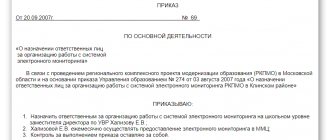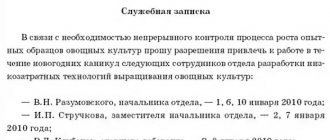What is suspension of an employee from work?
Complete removal from work at the initiative of the employer implies preventing an individual from performing the duties stipulated by the employment contract for good reasons. Such an administrative measure does not entail termination (change) of the terms of the contract, but in some cases it may provide for subsequent dismissal as a disciplinary measure. The initiator, as a rule, is the employer, who draws up an order to remove the employee from work. In addition, the law gives the right to demand removal to authorized bodies (officials) if there are relevant provisions in regulations.
https://youtu.be/Z_Tfy3Gqs-o
How to register an event
When employing a person, the employer is obliged to enter into an employment agreement with him. It stipulates the list and scope of work that the employee must perform for a certain remuneration. When performing work duties, he reports to his immediate superior and the head of the company, and is also obliged to comply with labor regulations and act in the interests of the employer.
What is an internship
If a new employee is required to undergo an internship, it must be initiated by management, whose responsibilities include the correct execution of the procedure. For newly hired employees, it can be carried out on an individual basis. A similar training scheme is used when preparing to transfer a person to another workplace with a change in job function or when preparing him to replace a specialist during his absence.
Neglect of training, if it is regulated in legal or local acts, is considered a violation of labor legislation.
Grounds for removing an employee from work
The legal grounds for removal from work are listed in Art. 76 TK. The length of the period is determined by the fact that the reasons that led to the employee’s release from work duties have been eliminated. Salaries for the period of non-admission are not accrued or paid, except in cases of failure to undergo medical examinations or training/certification in labor protection through no fault of the specialist. In these situations, days of absence are regarded and paid as downtime.
Removal from work under the Labor Code of the Russian Federation - general grounds:
- Appearing at the workplace in a state of intoxication due to narcotic, alcohol or toxic intoxication.
- Failure to undergo a periodic (preliminary and other types) medical examination or training/certification in labor protection, as well as a psychiatric examination, if necessary, in accordance with the generally established procedure.
- Identification of various diseases - removal from work for medical reasons is also carried out if contraindications are discovered during the process of undergoing medical examinations to suit the position held. Confirmation of health status is carried out through the issuance of a medical certificate.
- Suspension (up to 2 months) of an employee’s special right - for example, a license to carry a weapon, a driver’s license to drive a vehicle, etc. In this case, dismissal from work under the Labor Code of the Russian Federation is carried out with the provision to the employee of the opportunity to work in another vacant position, including a lower paid one. A specialist's written consent is required.
- Requirement of authorized government agencies or officials, taking into account the norms of legal acts of the Russian Federation.
- Other cases according to the legislation of the Russian Federation.
Note! The organization does not have the right to choose whether to suspend an individual from work or not. If there is a reason, the employer is obliged to comply with the requirements of Art. 76 of the Labor Code and release the employee from performing work duties until the circumstances are clarified. Otherwise, liability threatens, first of all, the company itself, and then its officials.
Sample of an order for permission to work independently after an internship
The order for admission to independent work consists of three blocks: introduction, main text and final part. The law does not regulate the rules of paperwork. Consequently, employers have the right to independently develop the form, taking into account the standard details for official documentation. In particular, the indicated details include :
general information about the company where the internship is taking place. It is strongly recommended to use company letterhead to draw up the document, or to disclose in detail general information about the company at the top of the sheet;
- name of the document and its number;
- date and place of paper formation;
- motivational block. This implies the need to provide references to legislative acts that prompted the manager to issue an order upon completion of the subordinate’s internship. The director of the enterprise must disclose the purpose of drawing up the Order;
- general information about the employee who is allowed to work independently in a specific workshop of the company;
- the last date of the person's internship. It is assumed that the last day of the internship means that the employee is held accountable for his further professional actions, as well as for ensuring a safe working environment in the sense that the safety of the workplace may depend on the employee;
- If necessary, the document should include a link to the accompanying documentation. In particular, this means additional educational programs or courses in labor protection or other similar areas;
- the subject responsible for executing the order. Often this person is the trainee’s mentor or a personnel employee;
- date and visa of the company manager or other entity who has the right to carry out such actions. For example, a deputy director acting on the basis of a power of attorney.
It is important to emphasize that the order must be endorsed not only by the manager, but also by the trainee. In order to legally register the employment of a new employee after an internship, it is necessary to complete the following papers :
- Order on internship. This document has a standard form. It is endorsed on the first day of the designated period. This document records the specific frequency of the internship, or the minimum conditions upon achievement of which the internship is considered successfully completed. Among other things, the document may also record additional courses that the employee needs to take. Also in this order you should note general information (name and position) about the mentor.
- Checklist for completing introductory and initial briefings on behalf of the director of the enterprise. This document relates to the department of the enterprise itself and is internal. This determines the organization’s right not to present control sheets to any regulatory authorities, unless the basis is a court order.
- An internship log, which is maintained throughout the relevant period.
- Order on admission to independent work.
The number of working days that the subject spent on internship must be reflected in the briefing log.
Order of suspension from work
The personnel procedure for removal provides for the preparation of documents depending on the grounds. In one situation, the employer’s decision is sufficient; in another, a court decision is required. It is recommended that precise regulations be prescribed in the local regulations of the enterprise.
The employee is not allowed to work according to the employer's order. There is no unified form of this document. An enterprise has the right to develop its own form indicating the name of the company; Full name and position of the employee; circumstances and dates of suspension; as well as a document confirming the basis for preventing a person from working. It is prohibited to give vague reasons - “due to operational necessity”, “by decision of the general director”, “due to the difficult financial situation of the organization”, etc. The documents used to justify the actions of the administration are court decisions, acts, resolutions of government agencies, explanatory notes, etc.
Order of suspension from work - sample
Prohibitions
Restrictions for the employer begin at the search stage. There is a list of conditions that cannot be specified in an advertisement for the search for an employee. On July 14, 2013, amendments to the Law “On Employment” came into force. What do they include?
- It is prohibited to specify age restrictions for applicants in the advertisement. Most employers do not want to hire employees over 40 years of age, but now this cannot be said publicly.
- You cannot indicate that a female or male representative is required. But there are exceptions - work that can only be performed by people of one gender.
- Place of residence does not affect the employee's qualification level.
- Appearance is not related to business qualities.
- Also banned was nationality, which cannot be used to separate people.
- They don’t write about marital status, property status, or origin.
- Skin color and race should not influence the choice of an employee, nor should his native language.
- During the interview process, you cannot ask about plans for marriage (getting married), desire to have children (when and how many).
- Employees cannot be divided depending on political views, religion, or because of their attendance at any circles or unions.
Based on the above, we can conclude that an advertisement like “We are looking for a good-looking girl from 20 to 30 years old for the position of accountant” is not only illegal, but also discriminates against applicants on several grounds. Advertisers for such advertisements will be punished within the limits of the law.
The Ministry of Labor is trying to do everything to ensure that there is no discrimination on the part of employers. Although there have been no innovations regarding employees, no new requirements are imposed on them. A person can indicate to himself any information that he considers useful: qualifications, knowledge of languages, and even something from the prohibited list.
Lines from the Labor Code of the Russian Federation
Equalization of the rights of actual admission to work and the employment contract was still in effect in Soviet labor legislation (Article 18 of the Labor Code of the RSFSR). In the Labor Code of the Russian Federation, the legal regulation of this problem is significantly expanded:
- in Art. 16 states that the proper and timely execution of an employment contract does not matter: if an employee has started work, it means that he has entered into an employment relationship with all legal consequences;
- Art. 20 defines an employee as an individual who has entered into an employment relationship with another party;
- Art. 61 specifies the moment the employment relationship comes into force - this is the day of signing the employment contract or the actual admission to work, which was authorized by the employer’s representative or simply knew about it;
- Art. 67 requires the employer to properly draw up a written employment contract with the employee who has started work within three days, and gives the employee the opportunity to reasonably demand this;
- Art. 91 indicates the terms of remuneration, in particular, that labor remuneration is accrued from the first day of work, that is, actual admission to it.
Internship
According to the Labor Code, an internship can last from 2 to 14 work shifts.
This time should not be confused with the probationary period, which in most cases lasts 3 months, in some organizations – six months. If necessary, it can be extended by the employer for a longer period if he believes that the employee is not yet ready to independently perform professional duties, more precisely, to bear responsibility for them, to be responsible for the correctness of his actions, his own safety and the safety of others when performing a specific type of work.
There are specialties where internship is a mandatory part of entering the profession.
For example, drivers of any type of transport without training should not be allowed to work, since they deal with equipment that is especially dangerous to life - a car.
This meaning is reflected in paragraph 3.2 of RD-200-RSFSR-12-0071-86-12. A reference to the Regulations on professional development and internship, which was approved by the Ministry of Motor Transport on January 20, 1986, will be useful in this case.
But any professional activity implies a useful action, and not just the absence of harm, therefore the task of the mentor, who is assigned to each trainee employee, is to provide conditions. The latter should contribute as much as possible to the development of professional skills and the development of experience of the trainee.
Salary
Labor legislation defines the rights of employees to wages during a probationary period or internship. In accordance with its provisions, the amount of wages depends on such parameters as:
- qualification;
- volume of work performed;
- task completion time;
- quality of activity results;
- complexity of the work.
Based on the regulations of the law, we can conclude that during the period of training of an employee, the employer has no right not to pay him for his work. However, due to low qualifications, difficulties in implementing the plan and inadequate quality of labor results, management may assign minimum wages.
Parts of an order
The document consists of three main sections: introduction, body and conclusion. There is no unified form provided. Each organization has the right to develop and use the variation of the form that it deems most convenient.
The attached form and sample document satisfy all the basic requirements for such documents. They contain:
- Name and details of the organization where the internship is taking place. For convenience, orders of this type can be printed on a special corporate form.
- Number and full name of the order.
- Date and city of signing.
- The motivating part. It may contain a reference to legislative acts, as well as to a previous order on internship. The organization, represented by the manager or his authorized representative, must explain the purpose for which the document was issued.
- Full name of the employee who is allowed to work.
- End date of the internship. From this moment on, the employee is independently responsible for the consequences of his professional actions and for safety in specific working conditions.
- If necessary, a link to completed courses and passed tests in OT or other topics necessary for work.
- Who is assigned control over the execution of the order?
- Date and signature of the head of the organization or another person who has the right to do so. For example, the head of a department who acts by proxy.
What does “approved to work in fact” mean?
The law requires the employer to properly formalize the relationship that arises with the employee, that is, to sign an employment contract. Not all employers are scrupulous about legal requirements: many prefer to use the labor of employees without burdening themselves with written responsibilities. In such cases, the work agreement is concluded verbally and the employee, on behalf of the manager or his representative, begins to perform the work entrusted to him. This means that he is actually admitted to it .
IMPORTANT! From the point of view of the Labor Code, such registration of labor relations is improper.
When starting work without drawing up a document on mutual obligations, the employee does not familiarize himself with and does not sign a number of other mandatory documentation:
- inner order rules;
- employment order;
- collective agreement;
- job description;
- safety requirements, etc.
An employee who does not know his rights may think that the other party has complete control over his working hours, wages and working conditions. The Labor Code of the Russian Federation protects the weaker side of labor relations and legally equates actual admission to work to the full-fledged conclusion of an employment contract, even if it is not properly formalized.
Actual admission and probationary period
Can we talk about entrance examinations if it is required to start work so urgently that it is not possible to first draw up an employment contract, where all the conditions of the probationary period are usually prescribed? Usually not. Actual admission to work, as if by default, fixes the suitability of the employee accepted in this way.
However, by agreement of the parties, entrance examinations can be completed before the conclusion of an employment contract. To do this, you will have to spend time and effort signing a separate agreement on this issue, as required by Part 2 of Art. 70 Labor Code of the Russian Federation. Only in this case can it be transferred to the employment contract. It must be executed in 2 copies - for each party.
If such an agreement has not been drawn up, the employer does not have the right to establish a probationary period upon subsequent execution of the employment contract.
Evidence of actual permission to work
If the employer has not recorded in any way the moment of admission of the new employee, how can this be proven if it is necessary to protect their rights?
First, after three days, you should request a written document on the employment relationship. If the employer does not do this, he falls under administrative liability.
Evidence of labor relations in court can include:
- pass to the territory of the organization;
- providing the employee with a workplace;
- acts on receipt of stationery, materials, workwear, etc.;
- document confirming a medical examination;
- employee's name in plans, programs, lists, etc.;
- audio or video recordings where the employer’s representative gives instructions to the employee, and the employee performs the work;
- witness statements;
- an agreement on material liability (sometimes concluded “bypassing” the labor agreement, where there is interaction with certain values);
- other evidence.
How documentation is prepared after the internship
Order on fire safety and procedures for employees
After acquiring skills and experience in the work, the employee must be officially allowed to perform official duties, for this the following is done:
- In accordance with the requirements, an administrative act is issued at the enterprise. The content part indicates the full initials, the start and end dates of the internship and when you can begin independent work.
- The site or team manager is responsible for testing acquired knowledge, including how to safely operate equipment or how to walk around the site.
- The admission order must be signed in person and dated.
You can begin to perform your duties from the date specified in the administrative document.







